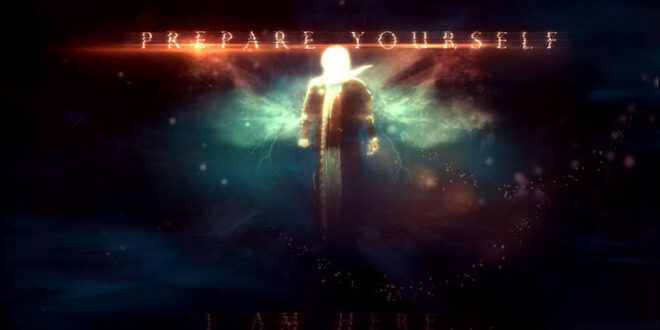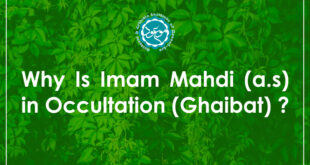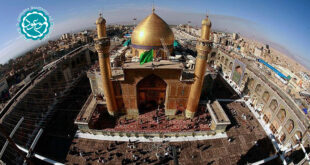592. Ghaybat of al-Shaykh10: Through his chain of narrators [meaning Ibrāhīm b. Salma, from Aḥmad b. Mālik al-Fazārī, from Ḥaidar b. Muḥammad al-Fazārī, from `Abbād b. Ya`qūb, from Naṣr b. Muzāḥim, from Muḥammad b. Marwān, from al-Kalbī, from Abū Ṣāliḥ,] concerning the saying of Allah, the Exalted: “Know that Allah will give life to earth after its death,” from ibn `Abbās who said: “It means, he will reform the earth through the Qā’im from the family of Muḥammad. ‘After its death’ means after the injustice [committed by] its people. ‘Indeed, We have made clear the signs for you’ with the Qā’im from the family of Muḥammad ‘so that you may understand.’”11
593. Dalā’il al-imāma12: Abū l-Ḥusayn Muḥammad b. Hārūn informed me from his father, from Abū `Alī al-Ḥasan b. Muḥammad al-Nahāwandī, from al-`Abbās b. Maṭar al-Hamdānī, from Ismā’īl b. `Alī al-Muqrī, from Muḥammad b. Sulaimān, from Abū Ja`far al-`Arajī, from Muḥammad b. Yazīd, from Sa`īd b. `Abāya, from Salmān al-Farsī who said: “Amīr al-Mu’minīn delivered a sermon in Medina. He had mentioned the fitna and its nearness, then, he spoke about the rising of the Qā’im from his descendant’s and that he would surely fill the earth with justice just as it would be filled with injustice . . . (to the end of the tradition in its entirety).”
594. Al-Kāfī13: Aḥmad b. Idrīs, from Muḥammad b. Aḥmad, from Ja`far b. al-Qāsim, from Muḥammad b. al-Walīd al-Khazzāz, from al-Walīd b. `Uqba, from al-Ḥārith b. Ziyād, from Shu`ayb, from Abū Ḥamza who recounts:
I went to see (Imam) Abū `Abd-Allah (al-Ṣādiq), peace be on him, and asked him, “Are you the master of this affair?” He replied, “No.” I asked again, “Is it your son?” He replied, “No.” I questioned again, “The son of your son?” He said, “No.” I asked, “The son of the son of your son?” He answered, “No.” I asked, “Then who is he?” He said, “He who will fill [the earth] with justice just as it will be filled with unfairness and injustice; during the concealment (fatra) of Imams, just as the Messenger of Allah, Allah’s blessings be on him and his family, was sent when there was an absence (fatra) of Messengers.
595. Farā’id al-simṭain14: Narrated to us `Abd al-Wāḥid b. Muḥammad b. `Abdūs al-`Aṭṭār al-Nīsābūrī, [from `Alī b. Muḥammad b. Qutayba al-Nīsābūrī, from Ḥamdān b. Sulaimān al-Nīsābūrī], from Muḥammad b. Ismā’īl b. Bazī`, from Ṣāliḥ b. `Uqba, from his father, from (Imam) Abū Ja`far, Muḥammad b. `Alī al-Bāqir, from his father—the Master of the Worshippers—`Alī b. al-Ḥusayn, from his father—the Master of the Martyrs—al-Ḥusayn b. `Alī b. Abī Ṭālib, from his father—the Master of the Heirs—`Alī b. Abī Ṭālib, Allah be satisfied with them all, from the Messenger of Allah, Allah’s blessings be on him and his family, who said:
The Mahdī is from my descendants. He will have an occultation and bewilderment in which the nations will be deviated. [Then,] he will emerge with the treasures of the prophets, peace be on them, and will fill the earth with justice and fairness just as it will be filled with injustice and unfairness.
596. Tafsīr Furāt al-Kūfī15: Narrated to me `Alī b. Muḥammad b. `Umar al-Zuhrī, through his sources from (Imam) Abū Ja`far, peace be on him, that
Al-Ḥārith al-A`war said to (Imam) al-Ḥusayn, peace be on him, “O Son of Allah’s Messenger! May I be sacrificed for you! Inform me about the saying of Allah in His Book, ‘By the Sun and its daylight’ (Quran 91:1)?” He replied, “Woe to you, O Ḥārith! This [verse] refers to Muḥammad, the Messenger of Allah, Allah’s blessings be on him and his family.” I asked, “And His saying, ‘And the moon when it follows the sun’ (Quran 91:2)?” He said, “This refers to Amīr al-Mu’minīn `Alī b. Abī Ṭālib, peace be on him, who follows Muḥammad, Allah’s blessings be on him and his family.” I enquired, “‘And the day when it reveals it’ (Quran 91:3)?” He said, “That refers to the Qā’im from the family of Muḥammad, Allah’s blessings be on him and his family. He will fill the earth with fairness and justice.”
597. Al-Nukat al-I`tiqādiyya16: From the Prophet, Allah’s blessings be on him and his family:
If nothing remains from the world but one hour, Allah will prolong that hour until a person from my progeny emerges. His name will be my name and his epithet will be my epithet. He will fill the earth with fairness and justice just as it will be filled with injustice and unfairness. It is obligatory for every creature to follow him.
598. Al-Muḥkam wa l-mutashābih17: Concerning the saying of Allah, the Exalted, “Allah is the Light of the heavens and the earth . . .”18 citing Tafsīr al-Nu`mānī through his chain of narrators from (Imam) al-Ṣādiq, from Amīr al-Mu’minīn, peace be on them: “Niche refers to the Messenger of Allah, Allah’s blessings be on him and his family; the lamp is the [first] heir (al-waṣī) and the [following] heirs; the glass is al-Fāṭima, peace be on her; and the blessed tree is the Messenger of Allah, Allah’s blessings be on him and his family, and the shining star is the awaited Qā’im who will fill the earth with justice.”
The traditions with following numbers also show the above concept: 72, 80, 91, 95, 149, 153, 160, 161, 165, 181, 194, 205, 216, 217, 219, 221, 225, 226, 227 (which says, “Allah, Mighty and Majestic be He, will fill the earth through him with light after its darkness and with justice after its injustice and knowledge after its ignorance), 235, 241, 246, 247, 249, 253, 254, 257, 259, 263, 272, 275, 280, 281, 291, 295, 321, 339, 346, 353, 360, 365, 366, 367, 370, 371 (which says, “unfairness, injustice, and oppression”), 374, 375, 378, 382, 390, 396, 400, 404, 406, 428, 429, 431, 451, 453, 454, 458, 460, 461, 463, 484, 485, 492 (which says, “he will fill the earth with justice just as it will be filled with injustice”), 494, 497, 498, 500, 502, 505, 507, 508,511, 513, 524, 527, 528, 532, 535, 541, 543, 544, 547, 548, 551, 555, 556, 557, 563, 564, 567, 570, 581, 612, 653, 670, 701, 726, 748, 764, 775, 791, 796, 806, 807, 810, 828, 859, 910, 950, 983 (which says, “He will fill the earth with truth and justice”), 1028, 1094, 1095, 1097, 1101, 1113, 1129, 1130, 1136, 1155–1160, 1195 (which says, “fairness and justice, light, and reasoning”), 1198, and 1204.
Notes:
1. Al-Fitan, vol. 5, chap. “Sīrat al-Mahdī . . .,” p. 192.
2. Al-Fitan, vol. 5, chap. “Sīrat al-Mahdī . . .,” pp. 192–93.
3. Al-Fitan, vol. 5, chap. “Sīrat al-Mahdī . . .,” p. 193 ; Kashf al-ghumma, vol. 2, p. 468 (short version).
4. Al-Musnad, vol. 3, p. 36; Kanz al-`ummāl, vol. 14, p. 271, no. 38691; `Iqd al-durar, chap. 1, p. 16, and chap. 3, pp. 36–37; Dalā’il al-imāma, chap. “Ma`rifat wujūb al-Qā’im,” p. 249, no. 40; Biḥār al-anwār, vol. 51, chap. 1, p. 82, no. 22, citing what has been gathered by al-Ḥāfiẓ Abū Nu`aim.
5. Kanz al-`ummāl, vol. 14, p. 586, no. 39659.
6. Kamāl al-dīn, vol. 1, chap. 30, pp. 317–318, no. 4; Biḥār al-anwār, vol. 51, chap. 3, p. 133, no. 5; I`lām al-warā, sect. 2, chap. 1, pp. 401–402.
7. Kamāl al-dīn, vol. 1, chap. 26, pp. 288–289, no. 1.
I say: It is clear that when he says “my eleventh descendant,” he is obviously referring to the eleventh Imam from his descendant’s—who is al-Mahdī, may my soul be sacrificed at his feet—and its first chain of narrators is definitely correct.
A similar tradition can be found in Ghaybat al-Nu`mānī, chap. 4, pp. 60–61, no. 4: “‘I am thinking about the child who will be from my loin (ẓahrī). He is the Mahdī who will fill it with fairness and justice just as it will be filled with unfairness and injustice. He will have a bewilderment and an occultation in which some people will deviate and others will be guided.’ I asked, ‘O Amīr al-Mu’minīn! How long will this bewilderment and occultation last?’ He replied, ‘A period of time . . .’” In this version, “my eleventh descendant” has not been recorded. In some versions “from the loin of my eleventh descendant” has been recorded but it is unclear if this is a scribal error or a variation in the contents of the books. [We don’t know] how this happened while the copy that the learned scholar, al-Qummī, regarded as original for its first edition, which he corrected and compared with numerous ancient manuscripts, did not contain any of these two additions!
What is understood from Biḥār al-anwār regarding the compatibility of the contents of Ghaybat al-Nu`mānī with that of al-Kāfī in the reply to the question about the duration of bewilderment and occultation, is inconsistent with the copy of Ghaybat al-Nu`mānī which we possess. For, he said: “a period of time (sibtun min al-dahr)” which is different to what has been recorded in al-Kāfī, the contents of which we will soon mention with their wordings. ‘Sibtun min al-dahr’ means a period of time which can be long or short.
Similarly, the contents of the printed version of the old handwritten manuscript of al-Ikhtiṣāṣ are also incompatible with that of al-Kāfī. Also, it does not have the question about the duration of bewilderment and occultation.
Al-Ikhtiṣāṣ, chap. “Ithbāt al-a’imma,” p. 209, with the difference that he said: “But I was thinking of the child who will be from the loin of my eleventh descendant; he is the Mahdī who will . . .” Apparently this is incorrect, because Imam Ḥasan al-`Askarī— the father of Imam al-Mahdī, peace be on him—is without doubt the ninth descendant of Amīr al-Mu’minīn, peace be upon him. Therefore, al-Majlisī has written in Mir`āt al-`uqūl that “it means from the loin of the eleventh Imam and ‘my descendant’ is used to describe the new-born . . . (to the end).”
Dalā’il al-imāma, p. 289, which is like what was in al-Ikhtiṣāṣ except that it ends like this: “I asked, ‘O Amīr al-Mu’minīn! For how long will this bewilderment and this occultation last?’ He replied, ‘Why [do you want to know]? How [do you expect] to have the knowledge of this affair, O Aṣbagh? They are the chosen ones of this nation and the righteous ones of this progeny.’”
Kifāyat al-athar, chap. 29, pp. 219–220, no.2, which says, “but I was thinking about the child who will be from my loin; my eleventh descendant who is the Mahdī. He will fill it with justice just as it will be filled with injustice and unfairness. He will have a bewilderment and occultation in which some people will deviate and others will be guided . . . (to the end of the tradition).” It must be noted that he has not recorded the entire tradition.
Al-Kāfī, vol. 1, p. 338, no. 7, with the difference: “I asked, ‘O Amīr al-Mu’minīn! How long will this bewilderment and occultation last?’ He said, ‘Six days or six months or six years.’” And also in the end: “for surely, He has alterations [in destinies], intentions, aims, and endings (badā’āt wa ‘irādāt wa ghāyāt wa nahāyāt).’” The copies vary in his saying, “from my loin, my eleventh descendant.”
Ghaybat al-Shaykh, pp. 103–104, same as al-Kāfī; Ithbāt al-waṣiyya, which is also the same as al-Kāfī which says, “from my loin.” Ithbāt al-hudāt, vol. 6, chap. “Al-Nuṣūṣ `ala . . .,” pp. 357–358, no. 20, citing al-Kāfī, which also records ‘from my loin’ but he has dropped the question and answer concerning the duration of bewilderment and occultation just as he has dropped the last part of the tradition. Perhaps, he has done so because he was uncertain about what he had dropped as it was in contrast to the contents of the remaining part of the tradition and even that of other traditions.
It is apparent that what has been recorded in al-Kāfī—regarding the answer (to the question) about the duration of bewilderment and occultation—is incompatible with his saying: “He will have an occultation and bewilderment in which some people will deviate and others will be guided,” because of the importance of the occultation, the examination of the people by it, the firmness of the deviated on their deviation, and the guided on their guidance. An occultation and bewilderment of merely six days, cannot be the cause of the bewilderment and deviation of the people and the same holds true for six months or six years. Once this time passes [the bewilderment] will be over but when its period is prolonged and extended, then some people will be deviated in it and will remain steadfast in their deviation.
To sum it up, the contents of the tradition in al-Kāfī are indeed confusing and muddled but there is no need to constrain ourselves to justify it because its chain is weak and because a narration with a correct chain and wording devoid of any disturbance and disorder and in accordance with other traditions exists [which opposes it]. This narration is what al-Ṣadūq has recorded in Kamāl al-dīn in one of his two chains of narrators for this tradition: “From his father and Muḥammad b. al-Ḥasan, may Allah be satisfied with them, from Sa`d b. `Abd-Allah . . . (to the end of what we already cited from him).” This (tradition) is reliable and others cannot be relied upon because of their disturbance and disorder, the variations in the different versions of the texts, and the weakness of the chain of narrators due to some of its narrators being unknown (majhūl).
One can rely on what has been narrated in Ghaybat al-Nu`mānī and Kifāyat al-athar because their text does not contain the disturbance and disorder (of al-Kāfī’s tradition) and the weakness in their chain of narrators is compensated by their harmony with the other traditions.
If someone says: al-Shaykh (al-Ṭūsī) has recorded this tradition in his al-Ghayba with an authentic chain of narrators which also has the question about the duration of bewilderment and occultation and the same answer found in al-Kāfī has been mentioned; Then, we would answer: It has been narrated in Al-Kāfī—with a chain of narrators which consists of some unknown narrators (majāhīl)—and al-Shaykh has recorded it using the wording of al-Kāfī through two chains of narrators, the first is the weak chain used in al-Kāfī but the second is other than that and is correct and authentic. Apparently, the latter is the shortened chain mentioned by al-Ṣadūq in Kamāl al-dīn and it is the one which we have relied on. It is clear for anyone who is skilled in the knowledge of traditions that the wordings of the tradition in Ghaybat al-Shaykh are exactly like those of al-Kāfī.
This is all we will say about the chain of narrators and the text of the tradition recorded in al-Kāfī. Furthermore, the consistency of the text recorded in Ghaybat al-Nu`mānī—who was also the scribe of al-Kulainī—should also be taken into account.
The contents of this tradition in al-Kāfī are similar to the contents of the tradition recorded by al-Ṣadūq in Kamāl al-dīn, vol. 1, chap. 31, pp. 323–324, no. 8, through his chain of narrators from our master Imam Zain al-`Ābidīn. We did not find some of the narrators in the rijāl books. This narration comprises of the duration of the short occultation: “Surely, our Qā’im will have two occultations; one of them will be longer than the other. The first will last for six days, six months, or six years, but the second, will become so long that most of those who believed in this affair (i.e. Imamate) will reject it and no one will remain steadfast in it except those who have strong certitude and correct recognition. (Those) who will not become discomforted because of what we have decreed or decided and will submit completely to us Ahl al-Bait.” The same things that we said about the tradition in al-Kāfī can also be mentioned here. To that we will add: six days or six months cannot be used to describe the meaning of occultation in such situations. Apparently, this tradition is in contradiction with that found in al-Kāfī and it is not correct to reconcile between them. This tradition cannot be used to verify what al-Aṣbagh has narrated—like what our Shaykh, al-Majlisī, has done—just as al-Aṣbagh’s tradition cannot be verified using this tradition. All we can say in such situations is that the owners of these traditions—i.e. the Ahl al-Bait, peace be on them—know their meanings best.
It is wrong to justify this narration—with its weak chain and troubling contents that have restricted the duration of the occultation to six days, six months, or six years— using the concept of badā’, which is one of the most important things on which the foundations of Prophethood and the benefits of dispatching the Messengers and sending down the Holy Books and even the system of religion, the world, legislation, and creation are laid. Because we believe badā’ will change only those things which can be proved by intellect (`aql) or sharia; things like death, illness, sustenance, calamities, afflictions, and etc., which can be changed by prayers, giving charity, bonding with relatives, and even through treatment with medicine. Also, any action which is effective in advancing or postponing the time of death or repelling calamities, changing blessings or reducing or increasing them—which we have proved elsewhere—are from the same category. Allah, the Exalted, says: “Allah erases what He wills and keeps (what He wills) and with Him is the Mother Book” (Quran 13:39), “Surely Allah does not change what is with a nation until they change what is with themselves” (Quran 13:11), “Had the people of the towns believed and were God-fearing, we would have certainly opened [or expanded] for them blessings from the sky and the earth, but they denied so we punished them because of what they used to do” (Quran 7:96), “If you be grateful, I will certainly give you more and if you be ungrateful, [then] My punishment is indeed severe” (Quran 14:7). It has also been narrated that “Protect your faith by giving charity and protect your wealth by paying zakāt and repel the waves of calamities through supplications” (Nahj al-balāgha, wisdom no. 146), and also “Bonding with relatives (ṣilat al-raḥim) increases age, prevents severe death, and keeps away poverty,” (Biḥār al-anwār, vol. 74, p.174).
8. Kifāyat al-athar, chap. 32, pp. 237–238, no. 2; Biḥār al-anwār, vol. 36, chap. 44, pp. 388–389, no. 3, citing Kifāyat al-athar with this chain: “`Alī b. al-Ḥusayn b. `Umar b. al-Ḥusayn, from Ḥusayn b. Zaid, from his (paternal) uncle `Umar b. `Alī, from his father.”
9. Dalā’il al-imāma, p. 249, no. 40.
10. Ghaybat al-Shaykh, p. 175, no. 131; Biḥār al-anwār, vol. 51, chap. 5, p. 53, no. 32; Ithbāt al-hudāt, vol. 3, chap. 32, sect. 12, p. 501, no. 287, and sect. 59, p. 581, no. 762; Muntakhab al-anwār al-muḍī’a, p. 18; al-Maḥajja, pp. 221–222.
11. Quran 57:17.
12. Dalā’il al-imāma, p. 253.
13. Al-Kāfī, vol. 1, chap. 138, pp. 340–341, no. 21; Ghaybat al-Nu`mānī, chap. 10, pp. 186–187, no. 38; Mir`āt al-`uqūl, vol. 4, p. 54, no. 21. Al-Majlisī writes: “Absence (al-fatra) between two Messengers is the period in which sending Messengers is paused and their heirs (waṣīs) are hidden. The fatra of Imams means they are concealed and do not appear for a long duration or there is an absence of a powerful and dominant Imam. This includes the era of all the Imams except Amīr al-Mu’minīn; and the first explanation seems more probable.”
14. Farā’id al-simṭain, vol. 2, p. 335, no. 587; Yanābī` al-mawadda, chap. 94, p. 448; Kamāl al-dīn, vol. 1, chap. 25, p. 287, no. 5; I`lām al-warā, chap. 2, sect. 2; Biḥār al-anwār, vol. 51, chap. 1, p. 72, no. 17; Ghāyat al-marām, chap. 141, p. 695, no. 30, and chap. 142, p. 695, no. 23; Ithbāt al-hudāt, vol. 3, chap. 32, sect. 5, p. 461, no. 105.
15. Tafsīr Furāt al-Kūfī, p. 212; see Ta’wīl al-āyāt al-ẓāhira and you will find other traditions from al-Ḥalabī, al-Faḍl Abū l-Abbās, and Sulaimān al-Daylamī; all of whom have interpreted the verse, “And the day when it reveals it” to the Qā’im and his rising, peace be on him.
16. Al-Nukat al-i`tiqādiyya, p. 35.
17. Al-Muḥkam wa l-mutashābih, p. 27; Ithbāt al-hudāt, vol. 2, chap. 9, sect. 26, p. 506, no. 468. It is appropriate that we mention here what has been mentioned in the book al-Kunā wa l-alqāb, chap. 3, pp. 68–69, under the name ‘Quftān’ citing A`yān al-Shī`a: “Shaykh Muḥammad Ṭāhā Najaf has narrated from al-Shaykh Aḥmad b. al-Shaykh Ḥasan b. al-Shaykh `Alī al-Najafī—the learned litterateur and poet (d. 1293 AH)—that he saw the Awaited Imam, peace be on him, in a dream and complained to him. The Imam answered him with these two lines of poetry:
For us is the return after a prolonged occultation
And we will fill it with justice just as it was filled with unfairness
Soon my promise will be fulfilled, say to those who disbelieve in me
Indeed this is a truth that my Lord will certainly (fulfill)
18. Quran 24:35.

 Mouood Mouood English Edition
Mouood Mouood English Edition



